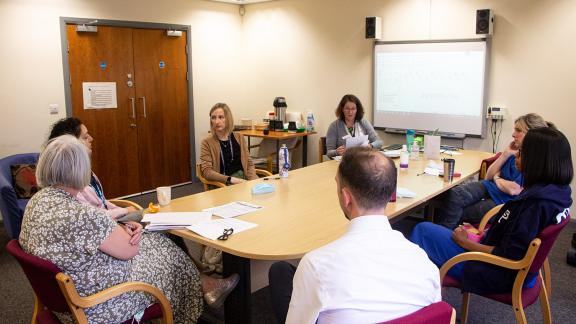Transforming workplace culture through an OD approach

Overview
Manchester University NHS Foundation Trust (MFT) entered a new chapter in April 2022 with the appointment of a new chief executive. This leadership transition provided a unique opportunity to reimagine the organisation’s culture, strategy and staff engagement approach, implementing a comprehensive cultural transformation programme alongside a renewed response to the National Staff Survey (NSS) results. The results of these joint initiatives demonstrated that a sustained, system-wide focus on culture and engagement can lead to measurable improvements, even amid organisational change.
Key benefits and outcomes
- Community of 150 staff ‘change agents’ established across the trust, reaching out to more than 6,500 colleagues.
- 22 recommendations for cultural change presented to the board to take action.
- Six new staff experience programmes launched based on staff feedback.
- NSS total respondents increased from 7,421 (2020) to 13,237 (2024).
- ‘Intent to leave’ score dropped from 38.8 per cent (2022) to 29.8 per cent (2024).
What the trust faced
The leadership change in 2022 coincided with significant organisational restructuring, including the formation of six new clinical groups. These changes, while essential for future growth, introduced complexity and disruption. At the same time, NSS data revealed that staff experience and engagement scores had remained static for five years, despite previous action plans.
This dual challenge prompted MFT to take a bold, system-wide approach. The trust recognised that improving staff experience required more than isolated interventions; it demanded a coordinated, inclusive strategy that addressed both cultural foundations and practical concerns.
What the trust did
Culture and Leadership Programme
Led by the Organisation Development (OD) team, MFT launched its third Culture and Leadership Programme (CLP) in autumn 2023 on the back of an extensive engagement series responding to the NSS results 2022. This six-phase programme (scoping, engaging, building readiness, discovery, design and delivery) explored the relationship between culture and strategy.
Drawing on expertise from NHS England, the Kings Fund and the Centre for Creative Leadership, the CLP aimed to embed compassionate and inclusive leadership across the trust.
A community of 150 change agents was established to support cultural discovery and implementation. These staff members participated in 55 learning sessions and 155 engagement events, reaching more than 6,500 colleagues. The insights gained led to 22 recommendations for cultural change which were prioritised through the ‘We Listen, We Act’ strategy and presented to the board in October 2024.
To support ongoing evaluation, MFT began developing a culture dashboard that integrates NSS results, workforce data and cultural insights with performance metrics. This tool will help clinical groups align their actions with the refreshed MFT people plan and five-year strategy.
Staff experience and engagement series
MFT responded to the 2022 NSS results with a new collaborative approach. Four system-wide workshops were held between March and November 2023, bringing together chief executives and workforce and OD directors to identify foundational changes needed to make a positive impact on staff engagement.
Six programmes were launched based on staff feedback:
- Flexible working
- Car parking and transport
- Food provision
- Management support
- Stretch opportunities
- Colleague community.
Each programme was led by clinical group chief executives and OD directors, supported by dedicated project teams. Regular meetings, a central intranet hub and consistent communication helped maintain momentum.
The role of change agents
Change Agents have been central to both cultural transformation and staff engagement efforts. Their involvement ensures staff voices remain at the heart of decision making and cultural change is embedded across all levels of the organisation.
Their role includes:
- facilitating engagement activities
- advocating for change
- advocating for NSS completion
- supporting the development of the culture dashboard
- bridging the gap between NSS insights and local action plans.
By aligning strategic priorities with staff feedback and embedding change at all levels, MFT sought to create a culture of collective leadership and a workplace where people feel valued, supported and empowered to deliver high-quality care.
Results and benefits
The combined impact of the cultural improvement programme and staff experience initiatives was reflected in the 2023 and 2024 NSS results:
- Survey response rate increased from 39 per cent (2023) to 45 per cent (2024).
- Total respondents grew from 7,421 (2020) to 13,237 (2024).
- All NHS People Promise themes showed statistically significant improvement (except staff engagement).
- Workplace recommendation increased from 57.4 per cent (2023) to 59.7 per cent (2024).
- Confidence in care quality rose from 63.6 per cent (2023) to 65.6 per cent (2024).
- Intent to leave dropped from 38.8 per cent (2022) to 29.8 per cent (2024).
These results demonstrate that sustained, system-wide focus on culture and engagement can lead to measurable improvements, even amid organisational change.
Overcoming challenges
MFT faced several challenges throughout this journey. The scale of the organisation required diverse communication strategies, including global messaging, divisional updates, walkarounds and word-of-mouth. Initial engagement with the six staff experience initiatives was slow, but executive-level sponsorship helped build momentum.
As the six initiatives evolved post-2024, they began to reflect more localised priorities within clinical groups, aligning with the trust’s broader strategic goals. Regular updates and action planning was continued through collective leadership and cross-department collaboration
Frontline engagement was identified as essential to achieving comprehensive feedback and engagement. Flexible engagement tools were developed to accommodate a variety of audiences across the trust and maintaining this flexibility and adapting the engagement tools used throughout was key.
Change agents were kept engaged and motivated through weekly 'culture scrums', dedicated 'culture corners' and ongoing online via Microsoft Teams.
Takeaway tips
- Engage early and widely: system-level change requires collaboration across all partners.
- Secure executive buy in: culture change must be championed from the top.
- Use workforce data strategically: NSS, retention, sickness and appraisal data all offer valuable insights.
- Ensure data clarity: accurate interpretation of staff metrics is essential for informed decisions.
- Leverage internal networks: change agents and OD teams can drive meaningful engagement.
- Communicate broadly and consistently: use multiple channels to reach all parts of the organisation.
- Listen before acting: staff feedback should lead and shape strategy and priorities.
- Set clear objectives: track progress and demonstrate impact through measurable outcomes.
Contact
For more information on the work in this case study, contact:
- Tracy Milnes, Interim Assistant Head of Organisational Development, MFT - Tracy.Milnes@mft.nhs.uk (Engagement Series)
- Craig Parsons, Senior OD Manager, MFT - Craig.Parsons@mft.nhs.uk (Collective Leadership & Culture Programme)



